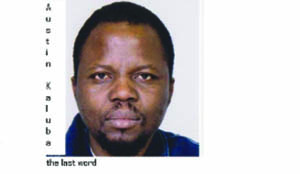 I have celebrated numerous Christmases and it is interesting to note the changing phases of this day which now retains little of its religious significance since it has largely been commercialised to a point of becoming a social event.
I have celebrated numerous Christmases and it is interesting to note the changing phases of this day which now retains little of its religious significance since it has largely been commercialised to a point of becoming a social event.
It is also fascinating to note that though the vast majority of Zambians still celebrate Christmas, most find the religious elements of the holiday diluted than in the past — and few people care about that change.
Zambia being a Christian nation means 90 per cent of its citizens celebrate Christmas in some form, a figure that has “hardly budged at all” since we have citizens who employ the religious aspect and those who religiously observe the social element.
The changes in attitudes are reflected in how people plan to spend their time during Christmas.
Some save money to buy food and drinks to observe this day while others prepare to attend a church service.
Whichever way, Christmas is a bigger day than the Independence celebration, the latter which is now threatened with losing its original nationalistic fervour.
In yesteryears, more celebrants spent Christmas Eve or Christmas Day with loved ones, while others would attend a religious service.
Even then you could hear half-pagan, half Christians celebrating the day in taverns where they would drunkenly sing to Baba Gaston’s massively popular song Kakolele Viva Christmas.
Mabel Mafuya’s evergreen jaunty song Happy Christmas, Happy New Year, composed in 1960, would be blaring from the radio, Juke boxes and record players.
People would buy delicacies like chicken, rice and soft drinks from ZCBC or NIEC stores and hold parties in their houses, dancing the whole night till Boxing Day (26th December).
Children or anyone who shouted Christmas box! on Boxing Day would receive a token in form of money or any other gift.
People would argue what came first between Christmas and New Year.
I also remember middle class Zambian families celebrating Christmas complete with observation of cooking a turkey, a family member donning Santa Claus attire and all the yuletide aspects of western Christmas.
I also remember that as children, we would participate in the nativity plays at church re-enacting the birth of baby Jesus in a manger.
The number of people observing the religious aspect of Christmas has declined in recent years.
More celebrants only observe the social aspect of the holiday by drinking heavily, giving out Christmas cards and eating special meals.
Since we have more cars on the roads now, more people are celebrating the event away from home, raising concerns from authorities.
Normally, Christmas should be a time to spend with the family, and while this is true, in its strictest sense, the event should be more religious than anything else, since it is a celebration of the day Jesus Christ was born.
Here, I don’t want to be dragged into the debate of whether this is the actual day Christ was born since I feel Christmas should be a symbolic birthday of the messiah. Period!
Some people look forward to this day and open Christmas gifts on Christmas Eve and not wait for the `Big Day’ like others do.
So despite many misplaced perceptions about the day, most Zambians seem to find ways of enjoying Christmas.
And when it is all over, many people would be nursing hangovers, counting their meagre incomes which have been depleted by senseless spending and think of where to get money to pay for school requirements for their children.
The shylocks would sadistically target people reeling from the paralysing effects of yuletide to ‘help’ them limp on financially to the New Year.
Whichever way you look at it, Christmas celebration is here to stay.






